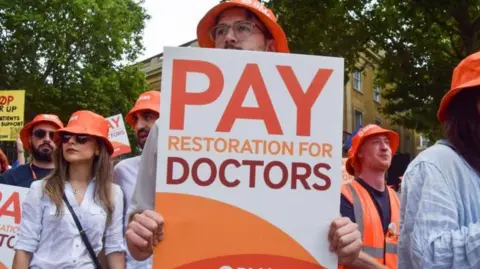Nick TriggleHealth Correspondent
 Getty Images
Getty ImagesDoctors' union, the British Medical Association (BMA), is acting “like a cartel” and threatening the future of the NHS, according to the Health Secretary.
Wes Streeting has attacked the doctors' union ahead of the 13th resident doctors' strike in their long-running dispute in England, which is due to begin on Friday.
Speaking at a conference of NHS providers in Manchester, Streeting said the BMA was holding the public and government to ransom through its actions.
He also criticized opposition to raising taxes on the wealthy as a way to invest more in public services.
But the BMA said it was simply trying to stand up for doctors and called on the health minister to return to negotiations.
In his speech, the Health Secretary said the BMA union was lobbying for tax rises in an attempt to protect pensions and consultants, the most senior NHS doctors who earned an average of £127,500 last year.
Five-day strike of resident doctors – who used to be called junior doctors – will start at 07:00GMT on Friday. It comes after talks between the government and the BMA broke down last week.
The government offered the union a deal to cover exam costs and expand training places faster than planned, but it was rejected by the BMA which stated that the payment problem needed to be resolved.
Streeting said he would not negotiate wages after resident doctors received pay increases of nearly 30% over the past three years.
But the BMA says that despite the pay rise, resident doctors' pay is still a fifth lower than in 2008 when inflation is taken into account.
“Unspeakable suffering for patients”
An audience of NHS managers applauded Streeting after he made perhaps his strongest attack on the BMA to date.
He said: “I just encourage them to think about a few things.
“Firstly, I am responsible for 1.5 million people in the NHS, not just resident doctors, many of whom have not had pay rises similar to those of resident doctors, and many of whom, at the peak of their career earnings, will never earn as much as the lowest paid doctor.
“The second thing I would say is that this strike is causing untold suffering and distress to patients who could do without it,” the health minister said.
“Thirdly, this is always the case, and especially in winter, it puts untold pressure on other NHS staff who are paying the price for the damage and destruction that resident doctors and the BMA cause to the service.
“I think the BMA leadership needs to seriously consider whether they currently want, with the green shoots of recovery, to take the system back because there is no more pro-NHS pro-NHS health secretary or government waiting in the wings.”
“It’s difficult for doctors to find work”
The Health Secretary then criticized the union for opposing higher taxes on the rich, which he said was an option to improve public finances and investment in the NHS.
“Let me tell you that when we ask some of the wealthier people to pay more, the most effective lobbyists against paying higher taxes are the BMA consultants committee and the BMA pensions committee.
“So what they're saying is, 'We want other people to pay doctors higher salaries.'
“It’s time for the BMA to become a reality. We will not be held to ransom. We will continue to work no matter what,” Streeting said.
“And I think it is becoming increasingly clear that the BMA is no longer the professional voice of doctors.
“They are increasingly behaving like a cartel and threatening not only the recovery of the NHS under the current government.
“They threaten the future of the NHS. And I think that's a morally reprehensible position.”
A BMA spokesman said it was “effectively advocating for doctors to find a solution that keeps doctors employed, able to see patients and compensated for lost wages so they remain in work now and in the future.”
“The Secretary of State must recognize the importance of demonstrating that the Government values the NHS workforce, rather than blaming them for acting when their pay remains a fifth lower than in 2008 and doctors struggle to find work even as patients wait many months to see a doctor.
The BMA added: “There will be a way to end this dispute and, like any professional association and trade union, it is our primary interest to get back to the table with the Government to get the negotiations right and reach a solution on both jobs and pay for the benefit of all.”








